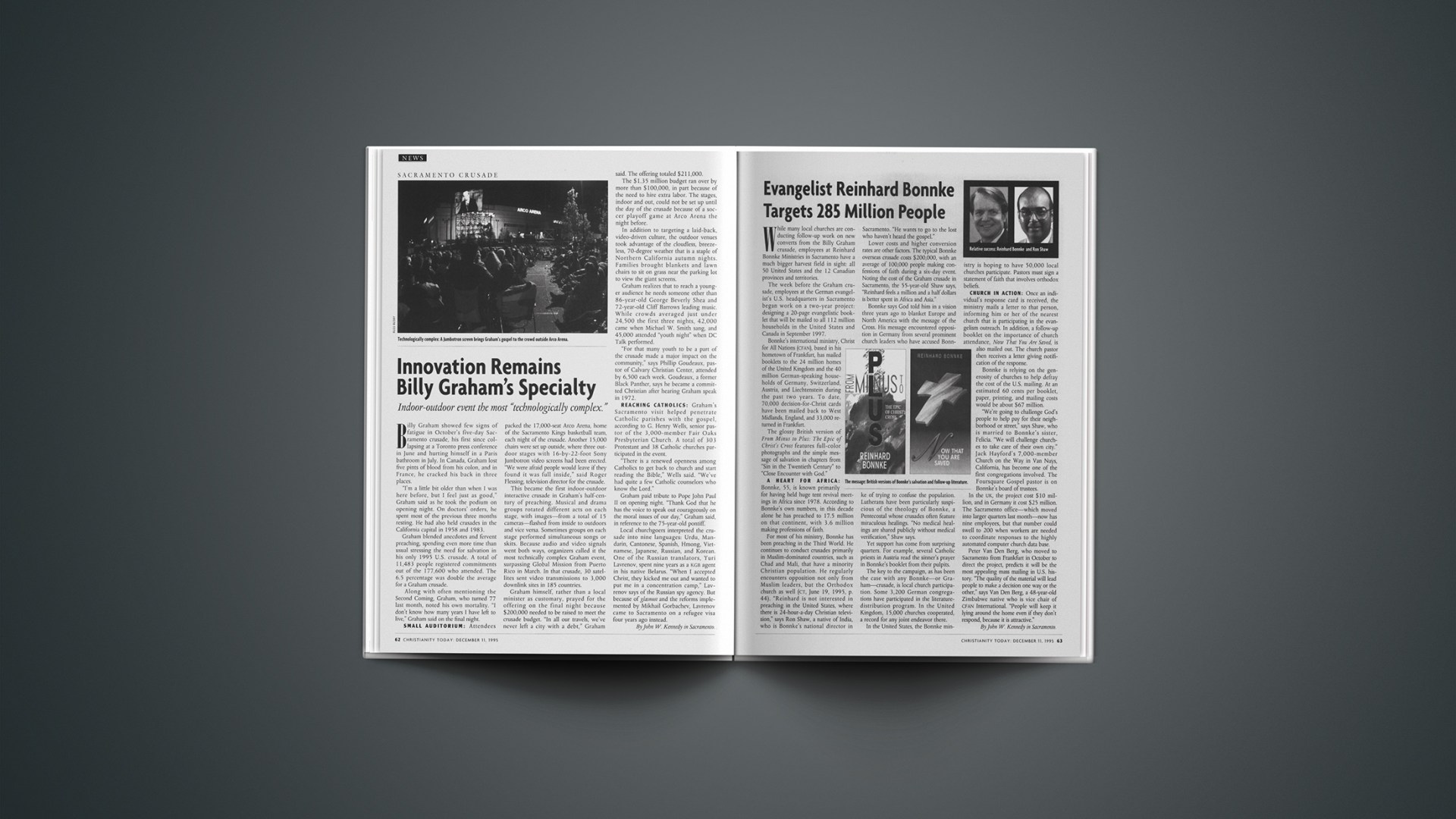Billy Graham showed few signs of fatigue in October's five-day Sacramento crusade, his first since collapsing at a Toronto press conference in June and hurting himself in a Paris bathroom in July. In Canada, Graham lost five pints of blood from his colon, and in France, he cracked his back in three places.
"I'm a little bit older than when I was here before, but I feel just as good," Graham said as he took the podium on opening night. On doctors' orders, he spent most of the previous three months resting. He had also held crusades in the California capital in 1958 and 1983.
Graham blended anecdotes and fervent preaching, spending even more time than usual stressing the need for salvation in his only 1995 U.S. crusade. A total of 11,483 people registered commitments out of the 177,600 who attended. The 6.5 percentage was double the average for a Graham crusade.
Along with often mentioning the Second Coming, Graham, who turned 77 last month, noted his own mortality. "I don't know how many years I have left to live," Graham said on the final night.
SMALL AUDITORIUM: Attendees packed the 17,000-seat Arco Arena, home of the Sacramento Kings basketball team, each night of the crusade. Another 15,000 chairs were set up outside, where three outdoor stages with 16-by-22-foot Sony Jumbotron video screens had been erected. "We were afraid people would leave if they found it was full inside," said Roger Flessing, television director for the crusade.
This became the first indoor-outdoor interactive crusade in Graham's half-century of preaching. Musical and drama groups rotated different acts on each stage, with images—from a total of 15 cameras—flashed from inside to outdoors and vice versa. Sometimes groups on each stage performed simultaneous songs or skits. Because audio and video signals went both ways, organizers called it the most technically complex Graham event, surpassing Global Mission from Puerto Rico in March. In that crusade, 30 satellites sent video transmissions to 3,000 downlink sites in 185 countries.
Graham himself, rather than a local minister as customary, prayed for the offering on the final night because $200,000 needed to be raised to meet the crusade budget. "In all our travels, we've never left a city with a debt," Graham said. The offering totaled $211,000.
The $1.35 million budget ran over by more than $100,000, in part because of the need to hire extra labor. The stages, indoor and out, could not be set up until the day of the crusade because of a soccer playoff game at Arco Arena the night before.
In addition to targeting a laid-back, video-driven culture, the outdoor venues took advantage of the cloudless, breezeless, 70-degree weather that is a staple of Northern California autumn nights. Families brought blankets and lawn chairs to sit on grass near the parking lot to view the giant screens.
Graham realizes that to reach a younger audience he needs someone other than 86-year-old George Beverly Shea and 72-year-old Cliff Barrows leading music. While crowds averaged just under 24,500 the first three nights, 42,000 came when Michael W. Smith sang, and 45,000 attended "youth night" when DC Talk performed.
"For that many youth to be a part of the crusade made a major impact on the community," says Phillip Goudeaux, pastor of Calvary Christian Center, attended by 6,500 each week. Goudeaux, a former Black Panther, says he became a committed Christian after hearing Graham speak in 1972.
REACHING CATHOLICS: Graham's Sacramento visit helped penetrate Catholic parishes with the gospel, according to G. Henry Wells, senior pastor of the 3,000-member Fair Oaks Presbyterian Church. A total of 303 Protestant and 38 Catholic churches participated in the event.
"There is a renewed openness among Catholics to get back to church and start reading the Bible," Wells said. "We've had quite a few Catholic counselors who know the Lord."
Graham paid tribute to Pope John Paul II on opening night. "Thank God that he has the voice to speak out courageously on the moral issues of our day," Graham said, in reference to the 75-year-old pontiff.
Local churchgoers interpreted the crusade into nine languages: Urdu, Mandarin, Cantonese, Spanish, Hmong, Vietnamese, Japanese, Russian, and Korean. One of the Russian translators, Yuri Lavrenov, spent nine years as a KGB agent in his native Belarus. "When I accepted Christ, they kicked me out and wanted to put me in a concentration camp," Lavrenov says of the Russian spy agency. But because of glasnost and the reforms implemented by Mikhail Gorbachev, Lavrenov came to Sacramento on a refugee visa four years ago instead.
Copyright © 1995 Christianity Today. Click for reprint information.
ctcurrmrj5TE0625B29










